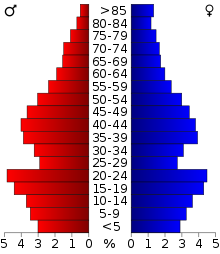Walworth County, Wisconsin
Walworth County | |
|---|---|
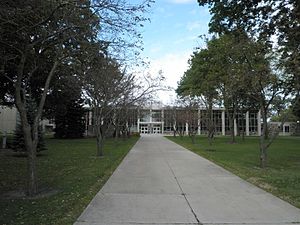 | |
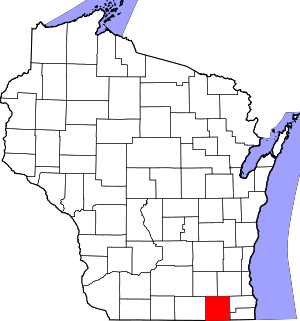 Location within the U.S. state of Wisconsin | |
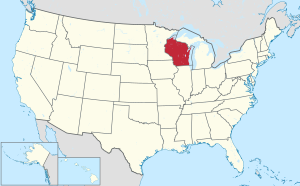 Wisconsin's location within the U.S. | |
| Coordinates: 42°40′N 88°32′W / 42.67°N 88.54°W | |
| Country | |
| State | |
| Founded | 1839 |
| Named for | Reuben H. Walworth[1] |
| Seat | Elkhorn |
| Largest city | Whitewater |
| Area | |
| • Total | 577 sq mi (1,490 km2) |
| • Land | 555 sq mi (1,440 km2) |
| • Water | 21 sq mi (50 km2) 3.7% |
| Population | |
| • Total | 106,478 |
| • Estimate (2023) | 105,822 |
| • Density | 191.7/sq mi (74.0/km2) |
| Time zone | UTC−6 (Central) |
| • Summer (DST) | UTC−5 (CDT) |
| Congressional districts | 1st, 5th |
| Website | www |
Walworth County is a county located in the U.S. state of Wisconsin. As of the 2020 census, the population was 106,478.[2] Its county seat is Elkhorn.[3] The county was created in 1836 from Wisconsin Territory and organized in 1839.[4] It is named for Reuben H. Walworth.[5] Walworth County comprises the Whitewater-Elkhorn, WI Micropolitan Statistical Area and is included in the Milwaukee-Racine-Waukesha, WI Combined Statistical Area. Lake Geneva, the University of Wisconsin-Whitewater, and Alpine Valley Resort, and Music Theatre are located in Walworth County.
Geography
[edit]According to the U.S. Census Bureau, the county has a total area of 577 square miles (1,490 km2), of which 555 square miles (1,440 km2) is land and 21 square miles (54 km2) (3.7%) is water.[6]
Transportation
[edit]Major highways
[edit]Railroads
[edit]Buses
[edit]Airport
[edit]East Troy Municipal Airport (FAA LID: 57C), serves the county and surrounding communities
Adjacent counties
[edit]- Waukesha County (northeast)
- Racine County (east)
- Kenosha County (east)
- McHenry County, Illinois (southeast)
- Boone County, Illinois (southwest)
- Rock County (west)
- Jefferson County (northwest)
Demographics
[edit]| Census | Pop. | Note | %± |
|---|---|---|---|
| 1840 | 2,611 | — | |
| 1850 | 17,862 | 584.1% | |
| 1860 | 26,496 | 48.3% | |
| 1870 | 25,972 | −2.0% | |
| 1880 | 26,249 | 1.1% | |
| 1890 | 27,860 | 6.1% | |
| 1900 | 29,259 | 5.0% | |
| 1910 | 29,614 | 1.2% | |
| 1920 | 29,327 | −1.0% | |
| 1930 | 31,058 | 5.9% | |
| 1940 | 33,103 | 6.6% | |
| 1950 | 41,584 | 25.6% | |
| 1960 | 52,368 | 25.9% | |
| 1970 | 63,444 | 21.2% | |
| 1980 | 71,507 | 12.7% | |
| 1990 | 75,000 | 4.9% | |
| 2000 | 93,759 | 25.0% | |
| 2010 | 102,228 | 9.0% | |
| 2020 | 106,478 | 4.2% | |
| U.S. Decennial Census[7] 1790–1960[8] 1900–1990[9] 1990–2000[10] 2010[11] 2020[2] | |||
2020 census
[edit]As of the census of 2020,[2] the population was 106,478. The population density was 191.7 people per square mile (74.0 people/km2). There were 53,146 housing units at an average density of 95.7 units per square mile (36.9 units/km2). The racial makeup of the county was 85.4% White, 1.1% Black or African American, 1.0% Asian, 0.4% Native American, 4.6% from other races, and 7.4% from two or more races. Ethnically, the population was 11.8% Hispanic or Latino of any race.
2000 census
[edit]At the 2000 census there were 93,759 people, 34,522 households, and 23,267 families in the county. The population density was 169 people per square mile (65 people/km2). There were 43,783 housing units at an average density of 79 units per square mile (31 units/km2). The racial makeup of the county was 94.49% White, 0.84% Black or African American, 0.23% Native American, 0.65% Asian, 0.03% Pacific Islander, 2.62% from other races, and 1.14% from two or more races. 6.54% of the population were Hispanic or Latino of any race.[13] Of the 34,522 households 31.80% had children under the age of 18 living with them, 55.40% were married couples living together, 8.20% had a female householder with no husband present, and 32.60% were non-families. 24.70% of households were one person and 9.20% were one person aged 65 or older. The average household size was 2.57 and the average family size was 3.07.
The age distribution was 24.20% under the age of 18, 13.80% from 18 to 24, 27.60% from 25 to 44, 21.80% from 45 to 64, and 12.70% 65 or older. The median age was 35 years. For every 100 females there were 98.90 males. For every 100 females age 18 and over, there were 97.20 males.
In 2017, there were 918 births, giving a general fertility rate of 48.8 births per 1000 women aged 15–44, the sixth lowest rate out of all 72 Wisconsin counties.[14]
Communities
[edit]
Cities
[edit]- Burlington (mostly in Racine County)
- Delavan

- Elkhorn (county seat)
- Lake Geneva
- Whitewater (partly in Jefferson County)
Villages
[edit]- Bloomfield
- Darien
- East Troy
- Fontana-on-Geneva Lake
- Genoa City (partly in Kenosha County)
- Mukwonago (mostly in Waukesha County)
- Sharon
- Walworth
- Williams Bay
Towns
[edit]Census-designated places
[edit]- Allen's Grove
- Como
- Delavan Lake
- Lake Ivanhoe
- Lake Lorraine
- Lauderdale Lakes
- Lyons
- Potter Lake
- Springfield
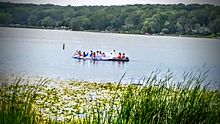
Unincorporated communities
[edit]- Abells Corners
- Adams
- Bardwell
- Big Foot Prairie (partial)
- Bowers
- East Delavan
- Fairfield (partial)
- Inlet
- Heart Prairie
- Hilburn
- Honey Creek (partial)
- Honey Lake (partial)
- La Grange
- Lake Beulah
- Lake Como
- Lake Lawn
- Lauderdale
- Lauderdale Shores
- Linton
- Little Prairie
- Millard
- North Bloomfield
- Pell Lake
- Powers Lake
- Richmond
- Spring Prairie
- Tibbets
- Troy
- Troy Center
- Voree
- Zenda
Ghost towns
[edit]Politics
[edit]Owing to its Yankee heritage,[15] which contrasts with the German-American or Scandinavian-American character of most of Wisconsin, Walworth County was initially a stronghold of the Free Soil Party.[16] It voted for Martin van Buren and John P. Hale in Wisconsin's first two presidential elections,[17] and its opposition to the spread of slavery led to its population voting Republican in subsequent elections,[17] even resisting the appeal of Wisconsin native Robert La Follette when he carried the state in 1924 as a Progressive.[18]
Walworth[18] County remains strongly Republican.[19] The only Democrat to carry the county was Woodrow Wilson in 1912, who won 36 percent of the vote. Even with the GOP mortally divided between President William Howard Taft and Theodore Roosevelt, Wilson only won the county by 29 votes. The best Democratic showings since then have been by Lyndon Johnson in 1964 and Barack Obama in 2008, both of whom received around 48 percent. Franklin D. Roosevelt and Bill Clinton are the only other Democrats since Wilson to cross the 40 percent mark, though Joe Biden came very close in 2020.
| Year | Republican | Democratic | Third party(ies) | |||
|---|---|---|---|---|---|---|
| No. | % | No. | % | No. | % | |
| 2020 | 33,851 | 58.77% | 22,789 | 39.56% | 960 | 1.67% |
| 2016 | 28,863 | 56.16% | 18,710 | 36.41% | 3,818 | 7.43% |
| 2012 | 29,006 | 55.46% | 22,552 | 43.12% | 745 | 1.42% |
| 2008 | 25,485 | 50.54% | 24,177 | 47.95% | 760 | 1.51% |
| 2004 | 28,754 | 59.35% | 19,177 | 39.58% | 515 | 1.06% |
| 2000 | 22,982 | 56.80% | 15,492 | 38.29% | 1,984 | 4.90% |
| 1996 | 15,099 | 45.81% | 13,283 | 40.30% | 4,579 | 13.89% |
| 1992 | 15,727 | 42.74% | 11,825 | 32.14% | 9,244 | 25.12% |
| 1988 | 18,259 | 59.50% | 12,203 | 39.77% | 223 | 0.73% |
| 1984 | 20,595 | 67.06% | 9,877 | 32.16% | 238 | 0.77% |
| 1980 | 19,194 | 56.90% | 11,344 | 33.63% | 3,192 | 9.46% |
| 1976 | 18,091 | 57.79% | 12,418 | 39.67% | 798 | 2.55% |
| 1972 | 17,823 | 66.09% | 8,598 | 31.88% | 546 | 2.02% |
| 1968 | 15,040 | 61.85% | 7,505 | 30.87% | 1,770 | 7.28% |
| 1964 | 12,225 | 50.92% | 11,746 | 48.92% | 38 | 0.16% |
| 1960 | 16,395 | 67.19% | 7,986 | 32.73% | 20 | 0.08% |
| 1956 | 16,696 | 76.62% | 4,922 | 22.59% | 172 | 0.79% |
| 1952 | 16,906 | 75.57% | 5,417 | 24.21% | 49 | 0.22% |
| 1948 | 10,509 | 65.07% | 5,377 | 33.29% | 265 | 1.64% |
| 1944 | 10,901 | 65.34% | 5,696 | 34.14% | 86 | 0.52% |
| 1940 | 11,594 | 67.59% | 5,449 | 31.77% | 111 | 0.65% |
| 1936 | 8,462 | 52.67% | 7,093 | 44.15% | 511 | 3.18% |
| 1932 | 7,858 | 52.91% | 6,790 | 45.72% | 204 | 1.37% |
| 1928 | 9,846 | 69.36% | 4,253 | 29.96% | 97 | 0.68% |
| 1924 | 7,484 | 57.22% | 1,162 | 8.88% | 4,434 | 33.90% |
| 1920 | 8,437 | 80.68% | 1,631 | 15.60% | 390 | 3.73% |
| 1916 | 3,988 | 59.66% | 2,440 | 36.50% | 257 | 3.84% |
| 1912 | 2,096 | 35.88% | 2,125 | 36.38% | 1,620 | 27.73% |
| 1908 | 4,151 | 62.21% | 1,960 | 29.37% | 562 | 8.42% |
| 1904 | 4,892 | 73.42% | 1,370 | 20.56% | 401 | 6.02% |
| 1900 | 5,102 | 71.41% | 1,742 | 24.38% | 301 | 4.21% |
| 1896 | 5,347 | 70.41% | 1,894 | 24.94% | 353 | 4.65% |
| 1892 | 3,871 | 58.52% | 2,153 | 32.55% | 591 | 8.93% |
Education
[edit]School districts include:[21]
K-12:
Secondary:
Elementary:
Wisconsin School for the Deaf, a state-operated school, is in the county.
See also
[edit]- National Register of Historic Places listings in Walworth County, Wisconsin
- Walworth County Fairgrounds
References
[edit]- ^ "County Directory - Walworth County". Wisconsin Counties Association. Retrieved May 13, 2007. [dead link]
- ^ a b c d "2020 Decennial Census: Walworth County, Wisconsin". data.census.gov. U.S. Census Bureau. Retrieved July 4, 2022.
- ^ "Find a County". National Association of Counties. Archived from the original on May 31, 2011. Retrieved June 7, 2011.
- ^ "Wisconsin: Individual County Chronologies". Wisconsin Atlas of Historical County Boundaries. The Newberry Library. 2007. Archived from the original on April 14, 2017. Retrieved August 15, 2015.
- ^ "Winnebago Took Its Name from an Indian Tribe". The Post-Crescent. December 28, 1963. p. 14. Retrieved August 25, 2014 – via Newspapers.com.

- ^ "2010 Census Gazetteer Files". United States Census Bureau. August 22, 2012. Retrieved August 9, 2015.
- ^ "U.S. Decennial Census". United States Census Bureau. Retrieved August 9, 2015.
- ^ "Historical Census Browser". University of Virginia Library. Retrieved August 9, 2015.
- ^ Forstall, Richard L., ed. (March 27, 1995). "Population of Counties by Decennial Census: 1900 to 1990". United States Census Bureau. Retrieved August 9, 2015.
- ^ "Census 2000 PHC-T-4. Ranking Tables for Counties: 1990 and 2000" (PDF). United States Census Bureau. April 2, 2001. Archived (PDF) from the original on October 9, 2022. Retrieved August 9, 2015.
- ^ "State & County QuickFacts". United States Census Bureau. Archived from the original on January 28, 2016. Retrieved January 24, 2014.
- ^ "County Population Totals: 2010-2020". Retrieved June 20, 2021.
- ^ "U.S. Census website". United States Census Bureau. Retrieved May 14, 2011.
- ^ "Annual Wisconsin Birth and Infant Mortality Report, 2017 P-01161-19 (June 2019): Detailed Tables". Archived from the original on June 19, 2019. Retrieved June 19, 2019.
- ^ Fowler, Robert Booth; Wisconsin Vites: An Electoral History, p. 14 ISBN 0299227448
- ^ Fowler, Robert Booth; Wisconsin Votes: An Electoral History, Volume 3, p. 11 ISBN 0299227405
- ^ a b Beckwith, Albert Clayton; History of Walworth County, Wisconsin pp. 98-99 Published 1912 by B.F. Bowen and Company, Indianapolis, Indiana
- ^ a b See Phillips, Kevin P.; The Emerging Republican Majority, pp. 441-442 ISBN 978-0-691-16324-6
- ^ See McDade, Philip J.; 'Congressional Restricting in Wisconsin' Archived January 20, 2018, at the Wayback Machine
- ^ Leip, David. "Dave Leip's Atlas of U.S. Presidential Elections". uselectionatlas.org. Retrieved November 11, 2020.
- ^ "2020 CENSUS - SCHOOL DISTRICT REFERENCE MAP: Walworth County, WI" (PDF). U.S. Census Bureau. Archived (PDF) from the original on October 9, 2022. Retrieved July 23, 2022. - [Text list]
Further reading
[edit]- History of Walworth County, Wisconsin. Chicago: Western Historical Company, 1882.
External links
[edit]- Walworth County
- Walworth County map from the Wisconsin Department of Transportation
- Travel Guide for Lake Geneva and Walworth County, WI
- Combination Atlas Map, 1873

